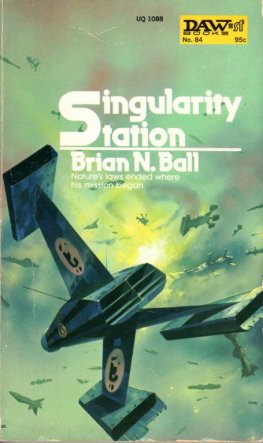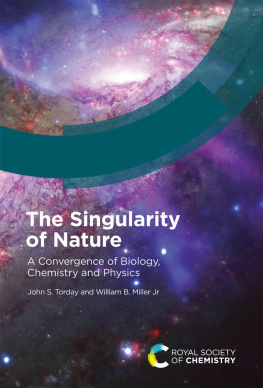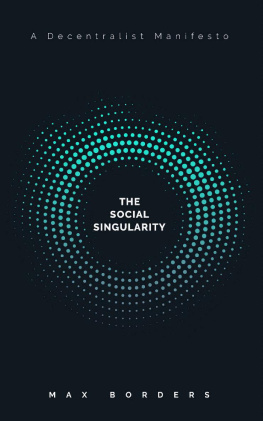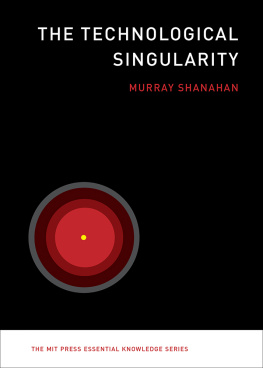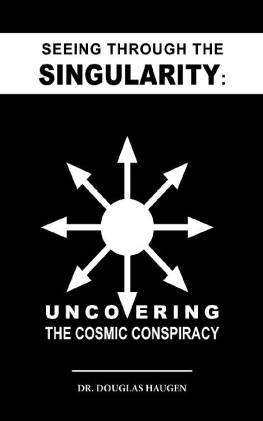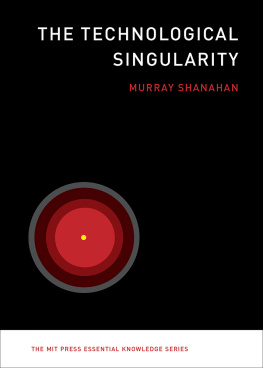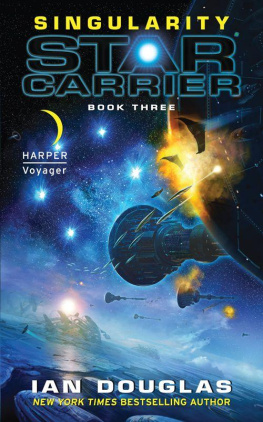John Charles Thomas Ph.d. - Turings Nightmares: Multiple Scenarios of the Singularity
Here you can read online John Charles Thomas Ph.d. - Turings Nightmares: Multiple Scenarios of the Singularity full text of the book (entire story) in english for free. Download pdf and epub, get meaning, cover and reviews about this ebook. year: 2016, publisher: CreateSpace Independent Publishing Platform, genre: Art. Description of the work, (preface) as well as reviews are available. Best literature library LitArk.com created for fans of good reading and offers a wide selection of genres:
Romance novel
Science fiction
Adventure
Detective
Science
History
Home and family
Prose
Art
Politics
Computer
Non-fiction
Religion
Business
Children
Humor
Choose a favorite category and find really read worthwhile books. Enjoy immersion in the world of imagination, feel the emotions of the characters or learn something new for yourself, make an fascinating discovery.
- Book:Turings Nightmares: Multiple Scenarios of the Singularity
- Author:
- Publisher:CreateSpace Independent Publishing Platform
- Genre:
- Year:2016
- Rating:3 / 5
- Favourites:Add to favourites
- Your mark:
- 60
- 1
- 2
- 3
- 4
- 5
Turings Nightmares: Multiple Scenarios of the Singularity: summary, description and annotation
We offer to read an annotation, description, summary or preface (depends on what the author of the book "Turings Nightmares: Multiple Scenarios of the Singularity" wrote himself). If you haven't found the necessary information about the book — write in the comments, we will try to find it.
Turings Nightmares: Multiple Scenarios of the Singularity — read online for free the complete book (whole text) full work
Below is the text of the book, divided by pages. System saving the place of the last page read, allows you to conveniently read the book "Turings Nightmares: Multiple Scenarios of the Singularity" online for free, without having to search again every time where you left off. Put a bookmark, and you can go to the page where you finished reading at any time.
Font size:
Interval:
Bookmark:
Turings Nightmares
Copyright (c) 2016 by John Charles Thomas.
ISBN - 978-1523711772
DEDICATION:
I dedicate this book to my grandchildren. It is their lives, more than mine, that will be touched by the issues raised in these scenarios. I hope that for them, the future of AI will be a good one, not so much a nightmare, but a wonderful if sometimes wild ride into new prosperity and peace. To: Sarah, Pierce, Sean, Mike, Katie, Tessa, Zoe, Jeremy, Avery, Kylee, and Norah. Be brave in a brave new world. And whatever happens in the ever-unfolding story of humanity, love as much as you possibly can.
My official degrees are in psychology although I have always been interested in science more generally and in mathematics. The approach I took to psychology in graduate school was computer simulation modeling of human thought. My first advisor was Walter Reitman, a protege of Herbert Simon. In grad school, I took graduate level courses in computer science as well as psychology. It struck me even then, as I turned in my card decks to the computing center that although the computer was supposed to be a tool for people, in fact, we pretty much ended up scheduling our time around that of the computer center. I managed a research project on the psychology of aging at Harvard Med School and programmed the computer there to run the experiments and analyze the results. Speculations and progress in AI still fascinated me. In 1973, I began work at IBM Research in Yorktown Heights. There, I had to opportunity to work closely with many outstanding computer scientists. In the mid 1980s I had the opportunity to start up an Artificial Intelligence Lab at NYNEX. Here, I was lucky enough to hire amazing folks who did world class work in Expert Systems, Speech Recognition and Synthesis, Human-Computer Interaction, and Machine Vision. Later, I rejoined IBM to work on knowledge management, the business use of stories and storytelling and cognitive computing.
All during these various adventures, I kept being struck by various ways that technology was influencing the social and individual lives of human beings. Most of these influences were unanticipated. For example, when two people do the dishes by hand, they typically are standing shoulder to shoulder working in a rhythm and finding a sense of accomplishment working together with one washing and rinsing and the other drying. Standing beside one another and not facing makes it easier to communicate about difficult topics. By contrast, when two people make use of a dishwasher, it is generally one person who rinses and loads the dishwasher. You can try to do it together but it is tricky to coordinate. No-one built a dishwasher with the goal of reducing human communication, but it can still have that effect.
In a similar fashion, I noticed that when I make dinner by hand for my wife and me, or for company, we need to have a small negotiation about what will be included in the ingredients. I can talk during the time that dinner is being made. Everyone sits down to eat together and that is conducive to conversation. Bt contrast, when we use the microwave, everyone chooses their own meal. One (usually my wifes) is done first. So she tends to sit down and start eating when that meal is ready, possibly multi-tasking on some computer game or texting. Again, there is a definite impact on social interaction even though the microwave was never designed to impact social behavior. If innocuous, low-tech machines such as the dishwasher and the microwave can impact our social behavior, how much more true will that be for information and communication technology?
Personal computers, the web, email, smart phones these already have had a tremendous impact on how we relate to each other and how work gets done. Technology is now so small and powerful and cheap that it is becoming ubiquitous as well. Add to this mixture the abilities of computers to handle ever-increasingly complex tasks. Computers are now able to do pattern recognition and learn quite well.
Some, famously Kurzweil, have suggested that in the next few decades, we will see a singularity in the evolution of intelligence. Basically, the idea is that scientists and engineers will build a machine that is not only smarter than a person, but one that can design a still smarter machine. Once this occurs, of course, we can imagine that machine to build a still smarter one and so on so that in very short order, machine intelligence will be far greater than human intelligence. I am not convinced that this will happen or, for that matter, that we even understand what it means for something so different from us as a computer is smarter than we are. However, I do think it is, in some sense, possible that it will happen. If it does, the impact on humanity will be tremendous. It will happen so quickly that we will have almost no time to react intelligently after the fact. The time to think about what this means for individuals and for society is now.
Even if The Singularity never really happens in the way some computer scientists imagine, there is no doubt that, barring some catastrophic event, AI will continue to increase in power and ubiquity and will still have a huge impact on society in the next few decades in terms of economics, social relations, education, medicine, business, and so on. It is hard to know what these impacts will be, but I can pretty much guarantee that at least some of the impact will be every bit as unanticipated as the side-effects of dishwashers, microwaves, automobiles, and the Internet will be. But the impact of AI will be much larger than the impact of any of those earlier innovations with or without a real Singularity. Again, the time to consider these issues is now.
Think about how much controversy still surrounds what is ethical on these issues: pulling the plug on someone on life support; assisted suicide; abortion; stem cell research; and even birth control. Why would we imagine any less fierce debates will arise around the changes in capability brought about by AI?
I mentioned that I managed, for a time, a research group at IBM on the business use of stories and storytelling. There are many such uses! One important use is scenario planning. The idea is to generate scenarios about possible futures. No one of these scenarios will necessarily come to pass, but the thinking about these possible scenarios will mean business leaders are much more able to react and adapt to what will really happen.
Similarly, I do not know which of the scenarios in this book will come to pass. Maybe none of them will. Perhaps, in some ways and in some places, many of them will. Regardless, the scenarios are meant to make you question what is possible, how you will feel about it, and to think about the ethical issues the scenarios raise.
I used the title Turings Nightmares by analogy to a fascinating book by Alan Lightman called Einsteins Dreams which consists of scenarios of various universes in which time behaves somewhat differently than in our universe. Of course, Einstein was a genius when it came to advancing our understanding of the physical world while Turing was a genius in advancing our understanding of computation and what it means as well as how we think about thinking.
Although I use the term Nightmares in the title, not all of these scenarios are negative. Artificial Intelligence has already provided some benefits and there are undoubtedly more to come. It is quite possible that a good future for humanity will depend on AI. On the other hand, there are a lot of things that can go wrong as well. Some of these negative things, as you will see, will simply be because AI has amplified some basic human failings. In other cases, AI will simply take a wrong turn because we will be unable to anticipate the actions of something that has emergent intelligence. Although based on a long career in human-computer interaction and AI, these scenarios are all fictional and any resemblance to real people, places and projects is purely coincidental.
Font size:
Interval:
Bookmark:
Similar books «Turings Nightmares: Multiple Scenarios of the Singularity»
Look at similar books to Turings Nightmares: Multiple Scenarios of the Singularity. We have selected literature similar in name and meaning in the hope of providing readers with more options to find new, interesting, not yet read works.
Discussion, reviews of the book Turings Nightmares: Multiple Scenarios of the Singularity and just readers' own opinions. Leave your comments, write what you think about the work, its meaning or the main characters. Specify what exactly you liked and what you didn't like, and why you think so.


